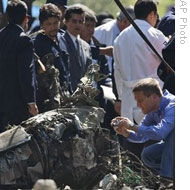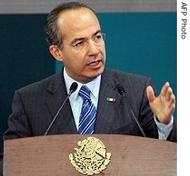voa标准英语2008年-Mexico Plane Crash Deals Blow to Anti-Crime Fig(在线收听)
 |
| An official for the U.S.'s National Transportation Safety Board inspects debris from a plane crash in Mexico City, 05 Nov 2008 |
The crash produced a horrific scene on one of Mexico City's busiest intersections. Dozens of automobiles burned in the fire caused by the crash and police evacuated nearly 2,000 people from the site.
The most prominent victim of the crash was Mexico's Interior Minister, Juan Camilo Maurino, a major figure on President Felipe Calderon's anti-crime team. Also killed was former chief prosecutor for drug crimes Jose Luis Santiago Vasconcelos.
Peter Zeihan is Vice President of Analysis for the Austin, Texas-based private intelligence and analysis company Stratfor. He says there is reason to suspect Mexico's powerful drug trafficking organizations were behind the plane crash.
"We cannot rule out that it was a mechanical failure," said Zeihan. "But considering the identity of the people on board, I think it is pretty obvious that the cartels are in some way responsible for this."
Ziehan says sources Stratfor has contacted within Mr. Calderon's government say officials there believe the crash was caused by the drug traffickers.
"The information that we are getting out of the Mexican government is absolute fury," he said. "We are seeing the elites of Mexico in a state of anger that we have never seen before."
Mexico expert George Grayson, who teaches at the College of William and Mary in Virginia, says if the drug gangs did bring down the plane carrying Juan Camilo Maurino and other officials, the implications are enormous.
"One has to only pray that the death of Juan Camilo was truly an accident and was not a move by the drug cartels to send a message to the Calderon administration to back off from their aggressive activities," he said.
 |
| Mexican President Felipe Calderon (file photo) |
Since taking office in December, 2006, President Calderon has waged a major war against the drug cartels, kidnapping gangs and organized crime in general. While Maurino was a major player in that effort, analyst George Grayson says the chief strategists are Mexico's Secretary of Defense and Attorney General, who will continue to prosecute the war on criminal gangs.
"It is a setback for Calderon," he said. "But it is not a fatal blow to his anti-cartel activities."
Peter Zeihan is less optimistic about Mr. Calderon's chances of successfully continuing his war on organized crime groups. Although Mexico has traditionally shunned direct U.S. involvement in its affairs, he says President Calderon may have to consider U.S. help on a level similar to America's involvement in Colombia, where the government has made major progress in defeating drug trafficking groups.
"Mexico is moving in one of two directions: One, this is going to break the back of the war on the cartels and Mexico is going to devolve into a failed state, which will force the United States to take much more direct action," said Zeihan. "Option Two, this is going to break the back of the Mexican resistance to getting the Americans involved, in which case we will be involved in a more direct way. Either way, the level of American involvement in the war against cartels in Mexico is about to skyrocket."
George Grayson says another approach would be to concentrate on the market for most of the drugs and the source of money that allows criminal gangs to thrive.
"The responsibility lies principally in the United States," he said. "We, after all, are the major consumer of the drugs produced in Mexico and the drugs that pass through Mexico."
Grayson says U.S. decriminalization of some drug use, better treatment and education programs, and perhaps even legalization of some drugs would shrink the size of the illicit drug market and undermine drug traffickers. He says that might allow Mexico to gain ground against the powerful criminal gangs who profit from the current situation.